Department of Student Affairs organizes an engaging session on “E-mail Etiquette”
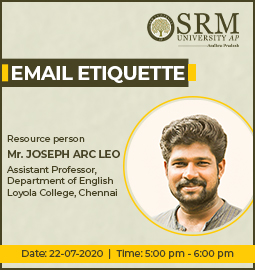 How to write a perfect e-mail? How to choose the salutation and subject line? How to begin and end the e-mail? These questions have bothered individuals at some point in their life. Needless to say, E-mail etiquette are now an essential part of professional grooming, and it is as important as your social etiquette. Get all your queries answered in this engaging session with Mr JOSEPH ARC LEO. Mr Leo is an Assistant Professor in the Department of English, Loyola College, Chennai. He will be joining us today, 22nd July at 5 pm to discuss proper e-mail etiquette that are to be followed. Registrar yourself quickly to avail the opportunity.
How to write a perfect e-mail? How to choose the salutation and subject line? How to begin and end the e-mail? These questions have bothered individuals at some point in their life. Needless to say, E-mail etiquette are now an essential part of professional grooming, and it is as important as your social etiquette. Get all your queries answered in this engaging session with Mr JOSEPH ARC LEO. Mr Leo is an Assistant Professor in the Department of English, Loyola College, Chennai. He will be joining us today, 22nd July at 5 pm to discuss proper e-mail etiquette that are to be followed. Registrar yourself quickly to avail the opportunity.
The Newsmakers: An interview with Dr Somesh on his journey as a researcher
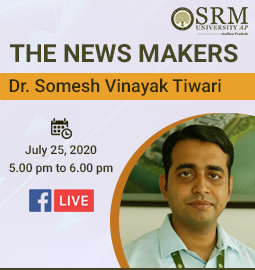 Dr Somesh Vinayak Tiwari, Assistant Professor, Department of Electrical and Electronics Engineering, joins The Newsmakers session on 25th July 2020 at 5 pm. Dr Somesh Vinayak Tiwari was awarded the prestigious “Outstanding Doctoral Students Award”, from Homi Bhabha National Institute (HBNI) at an event held at the Department of Atomic Energy (DAE) Convention Centre, Anushaktinagar, Mumbai. Dr Tewari was presented this award for his excellent PhD thesis titled “Study of surface flashover of insulator in gases at high pressure.” In the session of The Newsmaker, he will be interviewed by Dr Anuj Deshpande, Assistant Professor, Department of Electronics and Communication Engineering, on his journey as a doctoral scholar and researcher.
Dr Somesh Vinayak Tiwari, Assistant Professor, Department of Electrical and Electronics Engineering, joins The Newsmakers session on 25th July 2020 at 5 pm. Dr Somesh Vinayak Tiwari was awarded the prestigious “Outstanding Doctoral Students Award”, from Homi Bhabha National Institute (HBNI) at an event held at the Department of Atomic Energy (DAE) Convention Centre, Anushaktinagar, Mumbai. Dr Tewari was presented this award for his excellent PhD thesis titled “Study of surface flashover of insulator in gases at high pressure.” In the session of The Newsmaker, he will be interviewed by Dr Anuj Deshpande, Assistant Professor, Department of Electronics and Communication Engineering, on his journey as a doctoral scholar and researcher.
Watch the session live on our official Facebook page and avail the opportunity to know more about a doctoral scholar’s life from someone who has recently experienced it.
SRM AP organized webinar on “EFFECTIVE WAYS OF WRITING RESEARCH ARTICLE”
Prof Shobhana Narasimhan on “How to publish without perishing”
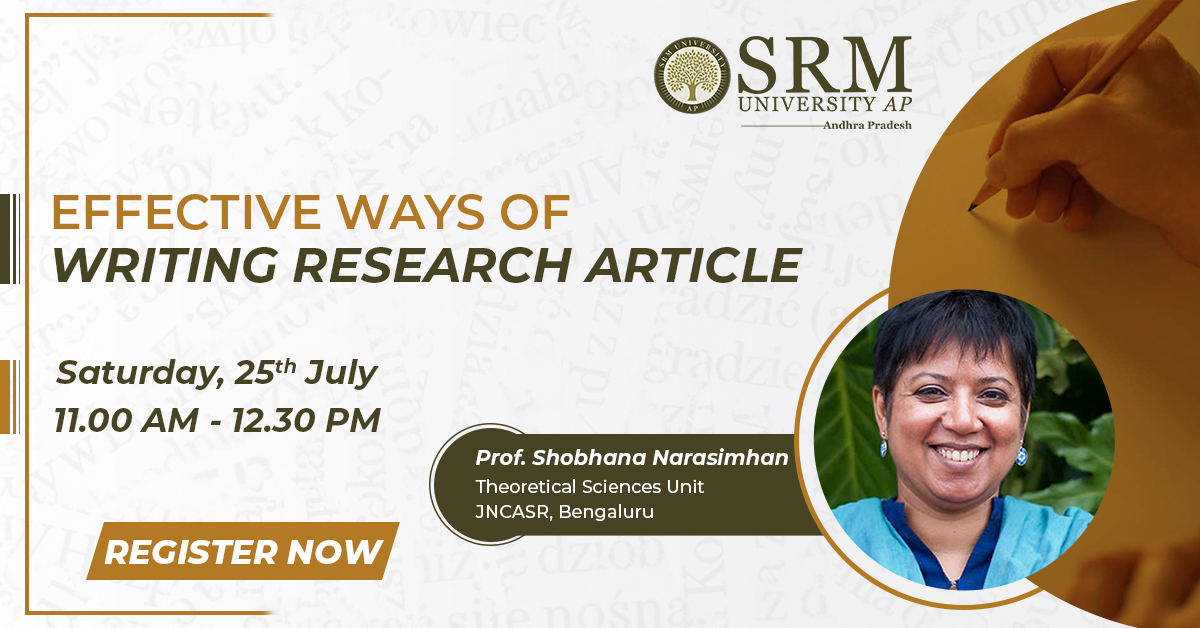 SRM University-AP, Andhra Pradesh organized a webinar titled “EFFECTIVE WAYS OF WRITING RESEARCH ARTICLE” to enhance the opportunities endowed to young scholars that would enable them to demonstrate their expertise and improve their critical analyzing skills. Prof D. Narayana Rao, Pro-Vice Chancellor, welcomed the guest speaker Prof Shobhana Narasimhan, Theoretical Sciences Unit, Jawaharlal Nehru Centre for Advanced Scientific Research (JNCASR), Bengaluru, and participants of the webinar through his opening remarks. Prof D. Narayana Rao explained the importance of higher education and research as they are critical contributors to sustainable livelihood and the economic development of the nation. He said, “Research serves as a hub to harbour innovative ideas that enlighten and propel the country forward socially, culturally, scientifically, technologically, and economically. In view of the requirements of the 21st century, the aim of quality university education is to develop good well rounded and creative individuals. Higher education and research must enable knowledge creation and innovation, thereby contributing to the economy.”
SRM University-AP, Andhra Pradesh organized a webinar titled “EFFECTIVE WAYS OF WRITING RESEARCH ARTICLE” to enhance the opportunities endowed to young scholars that would enable them to demonstrate their expertise and improve their critical analyzing skills. Prof D. Narayana Rao, Pro-Vice Chancellor, welcomed the guest speaker Prof Shobhana Narasimhan, Theoretical Sciences Unit, Jawaharlal Nehru Centre for Advanced Scientific Research (JNCASR), Bengaluru, and participants of the webinar through his opening remarks. Prof D. Narayana Rao explained the importance of higher education and research as they are critical contributors to sustainable livelihood and the economic development of the nation. He said, “Research serves as a hub to harbour innovative ideas that enlighten and propel the country forward socially, culturally, scientifically, technologically, and economically. In view of the requirements of the 21st century, the aim of quality university education is to develop good well rounded and creative individuals. Higher education and research must enable knowledge creation and innovation, thereby contributing to the economy.”
Prof D. Narayana Rao believes that institutes must build expertise that will impact the society for the next 3 decades and beyond. Prof D. Narayana Rao explained, “Simply tailoring people into jobs that exist today but are likely to change or disappear in the coming years, is suboptimal and even counterproductive. The universities and educational institutions need to instill the thought process and inquisitiveness among students by going beyond the classroom and expanding the frontiers of knowledge.” He urged that there is a dire need to emphasize the pride and prestige associated with research to make the students feel honoured and excited for undertaking scientific pursuits. Prof D. Narayana Rao informed, “At SRM AP, we encourage undergraduate and graduate students to get involved in research. This country has the legacy of producing young scientists who have published papers in highly reputed journals. Realizing that, we do encourage undergraduate students to get involved with research and publish papers in good journals. This also familiarizes our students to a research-intensive environment, benefiting them in their future endeavours”. Prof D. Narayana Rao concluded by requesting Prof Shobhana Narasimhan to motivate the students to carry out research and publish good research journals, believing that she will hypnotize the participants and inspire them to succeed.
Prof Shobhana Narasimhan began the presentation, “How to publish without perishing” with the purpose of improving the articles so that they find places in good journals. She initiated her talk by saying that writing papers is an integral part of the scientific research pursuits. Quoting Francois Arago: “To get to know, to discover and to publish in the destiny of the scientist”, and Robert Boyle: “Writing about science should be clear but it can also be made beautiful”, she explained the rules of effective research writing.
Prof Shobhana Narasimhan said that foremost, one needs to identify the reason for their willingness to write a paper. Further, she elaborated on the first rule of effective writing by mentioning that one should choose the journal carefully before writing the paper as the article should be aligned to the requirements and regulations of the particular journal in mind. Also, she suggested that one has to consider the extent of the readership of the journal, difficulty in getting the paper published in the journal, prestige associated with publishing in the journal, payment involved with the publishing, and the time required for the article to be published in the journal. She also said, “Often, invitations come from predatory journals and one should research carefully regarding the same. A publish in a predatory journal becomes a black mark in your career. It is better to go through the struggle of publishing in a respected journal than to go for the easy options”.
Prof Shobhana Narasimhan also speaks of constructing a story while writing the paper. She insisted, “The most important rule is to narrate a story while writing a paper. It is not just about calculations and results.” She explained the 3 steps associated with constructing the story. First, the research scholars require to ‘assemble the materials’. Depending on the requirement, one can use either of the three techniques: ‘mind maps’ which works better when there is one main concept and one can start from the centre, the second is ‘concept maps’ which works better when one has several related concepts and can use a flowchart to structure it from the top, and the third one is ‘timelines’ which works mostly with review articles, where a chronological sequence is used to assemble the materials. Prof Shobhana Narasimhan moved on to discuss the second step – ‘keeping and discarding information’. She used a schematic diagram to explain the usual proceedings of a scientific research. She said, “The path to scientific discovery is a complex tree-like structure. One does not need to describe all the blind alleys encountered during the research, a specific and balanced representation would be the ideal path to traverse.” Further, in the third step, one must ‘arrange the materials in a sequence’ which can be chronological or logical. Prof Shobhana Narasimhan informed, “In a scientific paper, a logical sequence is usually preferred. Play with the facts and results to construct a narrative and structure the argument in a flowchart to improve the efficiency.”
Prof Shobhana Narasimhan explained another rule: ‘clear what your message is’. She said, “The article should not be too clear, but it should be as clear as possible. Possible messages that one can provide in a paper include the most significant result, the second most significant result, new techniques and approach presented in the work or the existing method used in a new area, and whether the work contradicts/confirms the existing expectations.” She concluded by mentioning that the scholars need to tailor the paper to the journal’s audience by considering whether they are likely to be experts or laymen. This would allow the writer to construct the appropriate language for the paper and decide on the extent of information to be shared. She also urged researchers to use simple words when possible, check for grammatical errors, avoid plagiarism, abide by the journal’s style guidelines, and include a cover letter to increase the probability of getting their research articles published in reputed journals.
- Published in News, Research News, Webinars
Department of Student Affairs organizes “SOP Academics Meeting”
 Department of Student Affairs, SRM University-AP, Andhra Pradesh organizes the SOP Academics Meeting for the students of SRM AP on 28th July, 2020 at 4.45 p.m. During this internal session, the speakers and participants will discuss the protocols that would ensure a beneficial future of the students amidst the pandemic.
Department of Student Affairs, SRM University-AP, Andhra Pradesh organizes the SOP Academics Meeting for the students of SRM AP on 28th July, 2020 at 4.45 p.m. During this internal session, the speakers and participants will discuss the protocols that would ensure a beneficial future of the students amidst the pandemic.
Registration Link: Please Click Here
Department of Student Affairs organizes “Healthier Way of Online Learning”
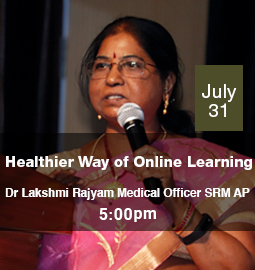 SRM University-AP, Andhra Pradesh will be commencing online classes for the upcoming semester from next week onwards. Considering the apprehension of the students regarding the health issues associated with the online classes, the Department of Student Affairs, SRM AP organizes a webinar where Dr Lakshmi Rajyam, Medical Officer, SRM AP will enable you to understand the healthier approach to online learning. Attend this benefitting webinar on 31st July 2020 at 5 p.m.
SRM University-AP, Andhra Pradesh will be commencing online classes for the upcoming semester from next week onwards. Considering the apprehension of the students regarding the health issues associated with the online classes, the Department of Student Affairs, SRM AP organizes a webinar where Dr Lakshmi Rajyam, Medical Officer, SRM AP will enable you to understand the healthier approach to online learning. Attend this benefitting webinar on 31st July 2020 at 5 p.m.
Registration Link: Please Click Here
The Newsmakers: Interactive session with the top-recruited students
 Another interesting session of The Newsmakers brings an exciting and funfilled conversation with our four champion students who have recently grabbed excellent job offers in the first-ever placement drive of SRM University-AP. Join Pesala Tanmayi, Koushik Bhargav, Tuhin Sarkar, Sri Harsha Tavidisetty Rajendra of CSE Department on August 08, 2020 at 5 pm and learn more about their journey at SRMAP.
Another interesting session of The Newsmakers brings an exciting and funfilled conversation with our four champion students who have recently grabbed excellent job offers in the first-ever placement drive of SRM University-AP. Join Pesala Tanmayi, Koushik Bhargav, Tuhin Sarkar, Sri Harsha Tavidisetty Rajendra of CSE Department on August 08, 2020 at 5 pm and learn more about their journey at SRMAP.
Department of Student Affairs organize “Reinventing Self Through the Science of Positive Psychology”
Department of Student Affairs is organizing a webinar on “Reinventing Self Through the Science of Positive Psychology”. Dr. Smita Sharma, Student Counsellor, SRM AP will be delivering a talk and interacting with the audience during the session to be held on 12th August , 2020 at 5pm.
INCLUSION OF POSITIVE MENTAL HEALTH SKILL BUILDING “WELL-BEING” PROGRAM IN EDUCATIONAL INSTITUTIONS
Student life is one of the most important phases of life. In this phase, students are on a journey to discover themselves personally and professionally as well. To understand and discover the potentialities, there is first a need to understand self – How the mind works and processes information? How to deal with life’s challenges? How to bounce back in times of adversities? How to make use of opportunities… how to empower and enable oneself to move towards a flourishing life? How to deal with failures? How to celebrate success?
Importance of Well-Being in Educational Institutions
Historically educational institutions have aimed for academic excellence as sole evidence for their success. Now, there are growing numbers of educational institutions who are now acknowledging the need to develop students in a more holistic way, with a stronger focus on well-being. Much of this is in recognition of the increasing statistics on psychological distress and mental illness in young adults, and the realization of the need to take a more proactive rather than reactive approach to mental health.
‘Well-Being Program’ based on positive psychology and positive education for educational institutions will act as an antidote to the complex emotions college students are exposed to especially in the present circumstances.
Well-Being: Well-being is an individual’s experience of satisfaction with the ‘past’, contentment with the ‘present ‘and hope for the ‘future ‘. The scientific construct of subjective well-being can be defined as both a cognitive and affective self-evaluation of one’s life and experiences.
Well-Being through the Scientific Study of Positive Psychology
Positive Psychology is a scientific approach to studying human thoughts, feelings and behavior, with a focus on strengths instead of weaknesses, building the good in life instead of repairing the bad, and taking the lives of average people up to “great” instead of focusing solely on moving those who are struggling up to “normal”. As a field, positive psychology spends much of its time thinking about topics like character strengths, optimism, life satisfaction, happiness, well-being, gratitude, compassion (as well as self-compassion), self-esteem and self- confidence, hope and elevation. These topics are studied in order to learn how to help people flourish and live their best lives.
Well-Being and Happiness
Happiness is “people’s evaluations of their lives and encompasses both cognitive judgments of satisfaction and affective appraisals of moods and emotions” (Kesebir & Diener, 2008). It is the experience of joy, contentment, or positive well-being, combined with a sense that one’s life is good, meaningful and worthwhile.
Well-being and Neuroplasticity
The ability of the brain to reorganize itself, both physically and functionally, throughout the life due to an individual’s environment, behavior, thinking, and emotions is called Neuroplasticity. It is important to understand that we have the opportunity to take more responsibility for the intentional shaping of our own minds and through that, we can shape our brains in ways that would enable fundamental constituents of wellbeing to be strengthened.
WELL-BEING PROGRAM
Well-being & Young Adults
Introducing Well-being in colleges aids students in developing positive self-perceptions and adaptive thinking styles, learning to set constructive goals and make healthy future predictions, and building skills to help manage emotions and cope with difficulty. Through this model, the students’ mental health is supported by nurturing their social, emotional and psychological skills, ultimately leading to well-being and happiness of the optimally functioning students.
There can be a long list of benefits of which the most important are:
• Increases engagement.
• Increases Life Satisfaction.
• Increases productivity
• Increases Hope and resilience
• Reduces and prevents symptoms of depression.
• Reduces hopelessness.
• Prevents clinical levels of depression and anxiety.
• Reduces and prevents anxiety.
• May reduce behavioral problems.
• Works equally well for individuals of different racial/ethnic backgrounds
The embedding of positive psychology research findings into education best practices—has also been shown to reduce or even prevent depression and anxiety, increase enjoyment and engagement in colleges, improve curiosity and love of learning, and enhance social skills like empathy, cooperation, assertiveness, and self-control, all of which are correlated with increased academic achievement.
Positive Education and Positive Psychology Skills will assist colleges to develop and maintain the optimal functioning of students and staff by making them efficient to prevent and cure mental illness, improve their productivity and life fulfillment, provide means to nurture their own talent and mainly build hope to deal with any challenges that come their way.
Registration Link: Please Click Here
Interactive session with Sri Ritika Katragadda on securing offer from AMAZON
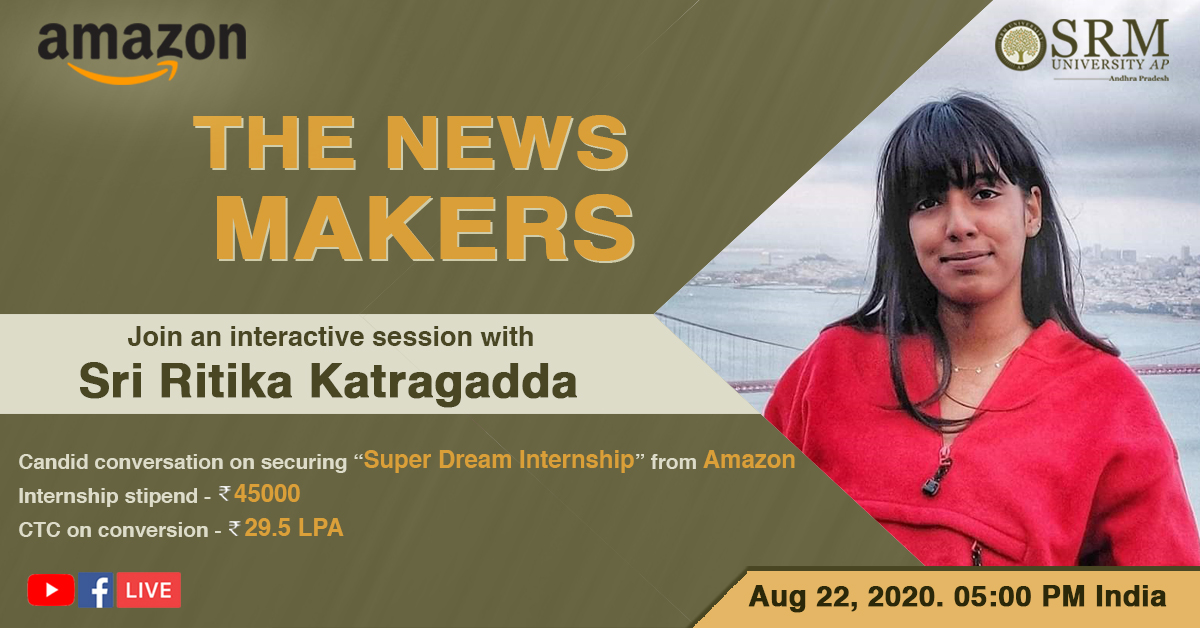 Sri Ritika Katragadda, Department of Computer Science and Engineering, SRM University-AP, Andhra Pradesh has secured an internship offer from Amazon with a stipend of Rs. 45000. Further, the offer will be converted into a job with a CTC of 29.5 LPA based on her performance. Sri Ritika has been exhibiting her mettle and flair for technology throughout her years at SRM AP as a student. Further, she received the opportunity from SRM AP to visit University of California, Berkeley for a semester where she fostered her skills. Also, she won several accolades being associated with Next Tech Lab, a student run forum at SRM AP which encourages the young minds to flourish. Her incomparable talent and vigour coupled with the trainings presented by the university has enabled her to receive the SUPER DREAM offer at Amazon.
Sri Ritika Katragadda, Department of Computer Science and Engineering, SRM University-AP, Andhra Pradesh has secured an internship offer from Amazon with a stipend of Rs. 45000. Further, the offer will be converted into a job with a CTC of 29.5 LPA based on her performance. Sri Ritika has been exhibiting her mettle and flair for technology throughout her years at SRM AP as a student. Further, she received the opportunity from SRM AP to visit University of California, Berkeley for a semester where she fostered her skills. Also, she won several accolades being associated with Next Tech Lab, a student run forum at SRM AP which encourages the young minds to flourish. Her incomparable talent and vigour coupled with the trainings presented by the university has enabled her to receive the SUPER DREAM offer at Amazon.
In an interactive session titled “The News Makers” organized by Department of Student Affairs on 22nd August at 5 p.m., Sri Ritika will share insights about her preparations for the placement drive, and the opportunities provided by the university that paved her way to success.
For registration, Please Click Here
Webinar on “Yoga and Meditation Techniques for COVID-19 and Beyond”
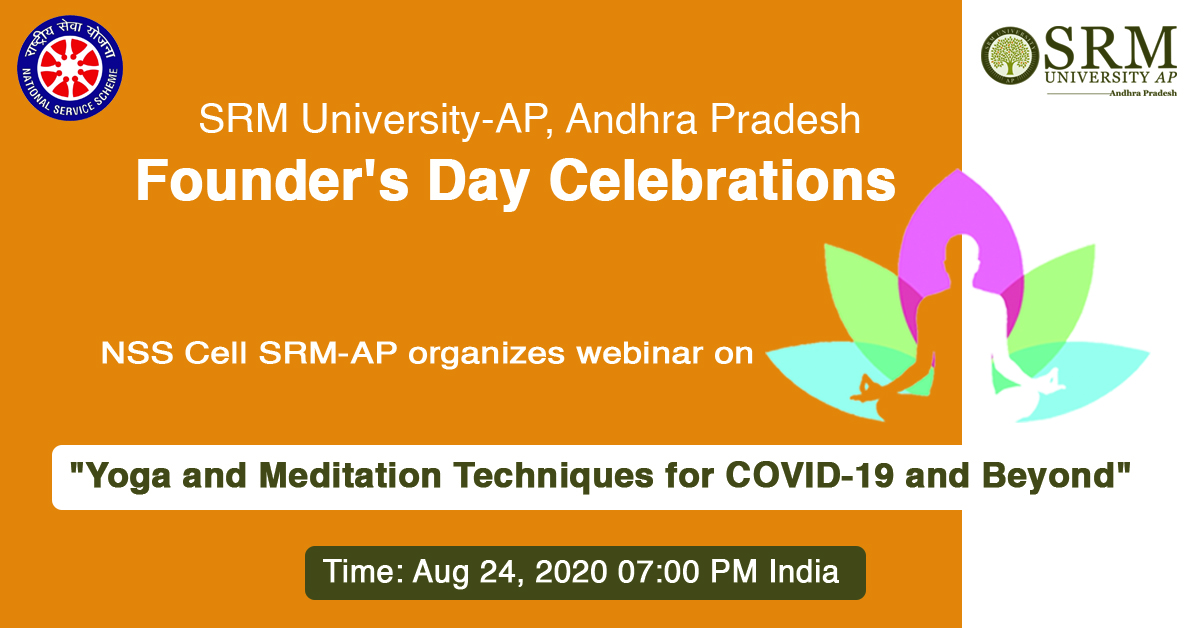 On the occasion of Founder’s Day of SRM University-AP, Andhra Pradesh, NSS Cell of SRM AP led by Dr A L Rao is organizing a webinar on “Yoga and Meditation Techniques for COVID-19 and Beyond”. The session will be initiated by a welcome speech from Prof V S Rao, Vice-Chancellor, followed by a note from Dr A L Rao, NSS Coordinator. Aravind, a student, will chant the invocation prayer to open the session, post which Mr Vaibhav More and Dr Ravindra Dhuli will take the attendees through the yoga positions. Also, the webinar will have Dr Venkata Nori in the panel to encourage the audience.
On the occasion of Founder’s Day of SRM University-AP, Andhra Pradesh, NSS Cell of SRM AP led by Dr A L Rao is organizing a webinar on “Yoga and Meditation Techniques for COVID-19 and Beyond”. The session will be initiated by a welcome speech from Prof V S Rao, Vice-Chancellor, followed by a note from Dr A L Rao, NSS Coordinator. Aravind, a student, will chant the invocation prayer to open the session, post which Mr Vaibhav More and Dr Ravindra Dhuli will take the attendees through the yoga positions. Also, the webinar will have Dr Venkata Nori in the panel to encourage the audience.
The faculty, staff, students, and parents are cordially invited to attend this enriching session on 24th August, 2020 at 7 p.m. COVID-19 is an ailment associated with multiple chronic susceptibilities. Hence, enhancing immunity through natural therapies, meditation, and yoga practices become instrumental in combating the illness. Also, the pandemic has caused immense psychological distress to many across the globe. Yoga-based lifestyle and meditation is a suggestive technique to reduce stress during the pandemic and beyond.
Interactive Session with “News Makers” who secured offer from HealthRX
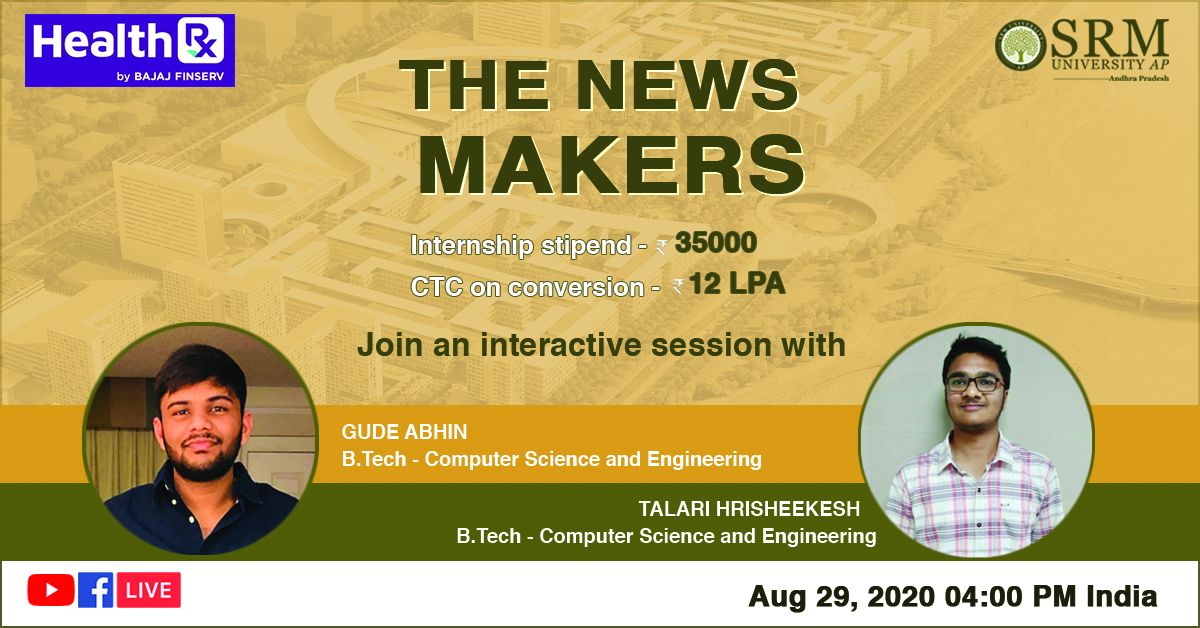 Department of Student Affairs, SRM University-AP, Andhra Pradesh brings another chapter of the webinar series “News Makers” on 29th August 2020 at 4 p.m. During this webinar, Talari Hrisheekesh, and Gude Abhin, Department of Computer Science and Engineering will be interacting with the audience. A renowned company Health RX has offered technical internship to them with a stipend of Rs. 35000. Further, the company has offered them a job offer with a CTC of 12 LPA on successful completion of internship. Being a role model for several students for receiving a dream offer at the initial stage of the placement season, a chronicle of their success would be a proven path to tread for others.
Department of Student Affairs, SRM University-AP, Andhra Pradesh brings another chapter of the webinar series “News Makers” on 29th August 2020 at 4 p.m. During this webinar, Talari Hrisheekesh, and Gude Abhin, Department of Computer Science and Engineering will be interacting with the audience. A renowned company Health RX has offered technical internship to them with a stipend of Rs. 35000. Further, the company has offered them a job offer with a CTC of 12 LPA on successful completion of internship. Being a role model for several students for receiving a dream offer at the initial stage of the placement season, a chronicle of their success would be a proven path to tread for others.
For registration, Please Click Here

